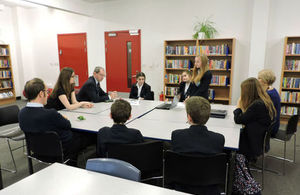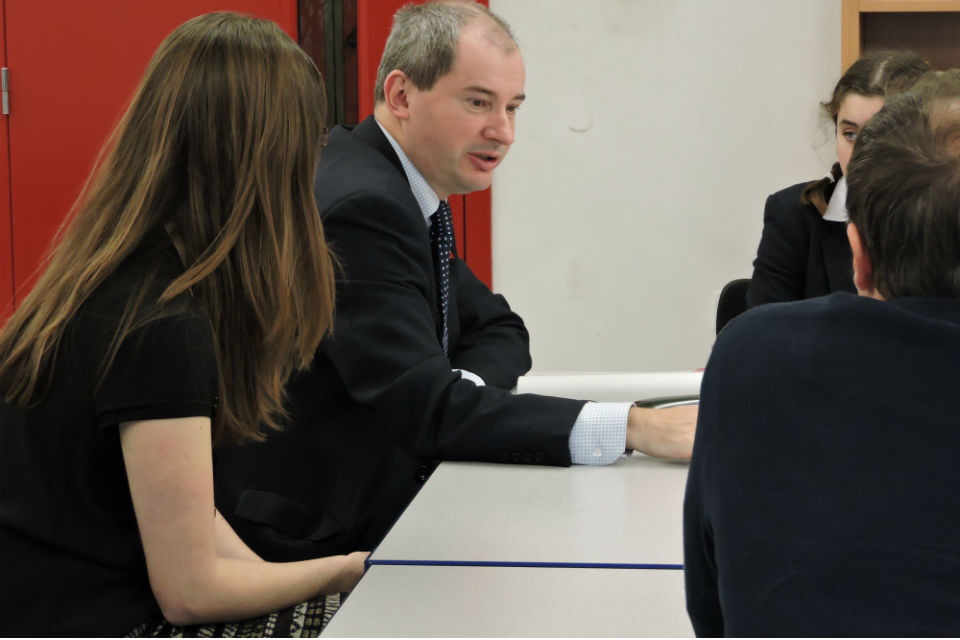Pupils share First World War experiences
Pupils home from the Western Front share First World War experiences with Communities Minister.

Pupils from Redland Green School present to Stephen Williams
Communities Minister Stephen Williams today (1 December 2014) met school children from Redland Green School and Colston’s Girls’ School who have visited the Western Front as part of a government funded remembrance initiative.
The Battlefields Tours Programme provides an opportunity for 2 pupils and 1 teacher from every state-funded secondary school in England to visit the Western Front battlefields of northern France and Belgium and take part in remembrance ceremonies over the four years of the First World War Centenary.
The project - part of the government’s centenary education programme - allows secondary school pupils to learn at first hand about the sacrifices made by the troops and the personal stories behind the soldiers of the First World War. It will also inspire pupils to reflect on why learning the lessons from the First World War is so important and what the war meant for people like them and their own local communities.
Children who do not visit the battlefields will also benefit from the tours when pupils and teachers who have taken part pass on what they have learnt from their experience.
Students and teachers from Redland Green School and Colston’s Girls’ School recently visited battlefields of the First World War on a 4-day trip. Students visited the Memorial Museum Passchendaele, the In Flanders Field Museum, the Tyne Cot, Langemark, Thiepval, Mill Road, Lijssenthoek and Devonshire cemeteries, the Ulster Memorial Tower, Thiepval Wood, Sheffield Memorial Park and heard the Ceremony of the Last Post at the Menin Gate in Ypres.

Stephen Williams with pupils at Redland Green School
Each day was focussed on a different theme and students where asked 3 questions: how did the First World War affect ordinary people, was the Battle of the Somme in 1916 really a disaster for the British Army, and is remembrance more or less important 100 years on?
Stephen Williams, Communities Minister said:
A visit to the battlefields of northern France and Belgium is a life changing experience. To see row upon row of white headstones is heart wrenching and, truly, there is no clearer demonstration of the service that our forefathers gave to ensure our freedom.
People from every background, faith and community fought during the First World War and over the next 4 years we will see every school from every community remember that. It is crucial that we help educate the next generation about this important part of our history so that it is never forgotten.
Redland Green School and Colston’s Girls’ School have undertaken a number of projects commemorating the First World War since returning from the battlefields. These have included a ‘pop up’ museum with school artefacts from the time including a report of a student’s outrage at being torpedoed by a German U-Boat and pupils returning to their primary schools to share what they had learnt from their experiences.
Eve Szczelkun a year 9 pupil at Redland Green School said:
I learnt a lot about a war that previously I knew little about. I learnt about people, places and battles. I think I probably know more about World War One than my history teacher! I think that this experience has persuaded me to study history further.
Merryn Evans a religious education, ethics and philosophy teacher at Redland Green School said:
The trip provided an excellent opportunity to develop engaging strategies for helping students appreciate the impact of World War One. The best part for me was the opportunity to ask serving soldiers about how the experience of the soldiers we were learning about compares to modern warfare. This made me question my own views about war.
The £5.3 million Battlefields Tour Programme is jointly funded by the Department for Communities and Local Government, and the Department for Education. Since the programme was launched last year a total of 1,511 schools from across the country have signed up and by March 2015, 721 schools will have been on a tour.
The Battlefields Tours Programme provides teachers with free Continuing Professional Development training before the tour allowing teachers to gain the skills to help pupils think like historians and challenge assumptions. Following the tour, support is also given to help teachers and pupils share their experience with the rest of their school and local community.
The tours also offer the chance to learn about the diverse history of the British Army during World War One and will include some schools visiting the Indian Memorial at Neuve Chapelle which commemorates more than 4,700 Indian soldiers and labourers who lost their lives on the western front and have no known graves.
To sign your school up or for more information visit the Institute of Education website.
Further information
The Battlefield Tours Programme is run by the Institute of Education and the School Travel Group.
The £5.3 million battlefields project is funded by the Department for Education and the Department for Communities and Local Government, and is part of the government’s wider First World War Centenenary commemorations.
2014 will mark 100 years since the start of the First World War. To honour and remember the lives of those who served in and were affected by the war the government is leading a national centenary programme of ceremonial events, cultural activity and education.
For more information on how the government is building a fitting commemoration of this significant milestone in world history, please see First World War Centenary.
Office address and general enquiries
2 Marsham Street
London
SW1P 4DF
Email [email protected]
General enquiries: please use this number if you are a member of the public 030 3444 0000
If your enquiry is related to COVID-19 please check our guidance page first before you contact us - https://www.gov.uk/guidance/coronavirus-covid-19-guidance-for-local-government.
If you still need to contact us please use the contact form above to get in touch, because of coronavirus (COVID-19). If you send it by post it will not receive a reply within normal timescale.
Media enquiries
Email [email protected]
Please use this number if you are a journalist wishing to speak to Press Office 0303 444 1209